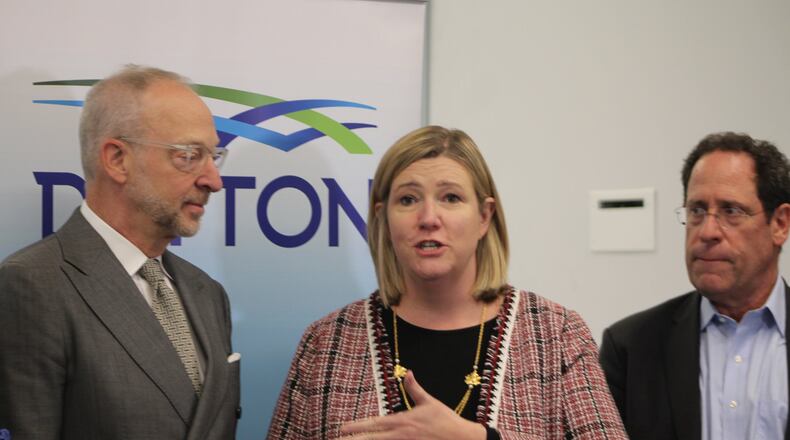There are only 429 U.S. opportunity zones with that ratio of jobs to residents, out of all 8,762 zones nationwide, said Katz, who was in Dayton on Wednesday as part of an economic summit.
Unlike most other U.S. cities, Dayton did a very good job of selecting its opportunity zones, which should pay off with new investment, he said.
“The rest of the country is looking at Dayton as a first mover on opportunity zones, so you can entice private capital around workforce housing, around commercial real estate, around investing in businesses,” he said.
On Wednesday, the city of Dayton and Accelerator for America hosted “Gem City Rising: Economic Resiliency and Renewal in Dayton.”
The event, at the downtown Dayton Metro Library, featured multiple speakers, panels and presentations about economic conditions, opportunities and financial tools in Dayton and was attended by more than 100 people, including developers, community leaders and entrepreneurs.
National experts came to Dayton to share best practices about attracting investment to the city and also to give developers and potential investors tips about how to continue to grow and succeed, said Dayton Mayor Nan Whaley.
“What’s been really exciting for me today … seeing national folks really interested in investing here because it’s easy to do business here, it’s easy to get the partnerships you need and you’re going to make a great social impact in Dayton,” Whaley said.
Multiple speakers focused on opportunity zones, which were created under President Trump’s 2017 tax reform bill, with the stated goal of providing tax breaks to people and companies that invest in economically distressed areas.
Dayton has 17 opportunity zones, which are low-income areas where investors can get tax incentives for long-term investments, according to the Ohio Development Services Agency.
All of downtown is an opportunity zone, and so are large swaths of east, south and southwest Dayton.
About 52,226 people live in opportunity zone areas in Dayton, or about 37 percent of the population, the city said.
Investors can defer or reduce taxes on their capital gains if they put the earnings into “opportunity” funds that invest in the opportunity zones.
Investors potentially can avoid all taxes on their capital gains from the opportunity funds, if they hold onto the investments for at least 10 years.
A study Accelerator for America expects to release later this month will highlight Dayton because of the work already being done in the Central Business District and downtown and how the city has multiple zones that are most primed for early investment through the federal program, Katz said.
“We expect there will be an enormous amount of attention from local investors and national investors in what’s going on here,” he said.
Katz said Dayton also was one of the first cities to create an "Investment Prospectus" through Accelerator for America, which spells out the city's competitive advantages, local partnerships and projects that are ready for investment.
The zones that will have the most success will have the best stories, and Dayton's story is very strong, said Rick Jacobs, CEO of Accelerator for America, which was a sponsor of the summit.
Dayton has momentum, with $210 million worth of projects underway in downtown, and the city makes it easy to invest here, Jacobs said.
“We’re very proud of what we see in Dayton,” Jacobs said. “And we hope the rest of the country gets to see it too.”
Accelerator for America, he said, identifies and develops solutions to economic insecurity and shares that information with cities across the country and tries to build national policy.
Dayton has focused on an asset-based economic development strategy that really works with the variety of available financing tools, including opportunity zones, and the city has plenty of job-ready sites, city leaders said.
“You are seeing really a transformation in our community underway, and people that want to invest want to be part of something special like that,” said Whaley.
About the Author

